Exclusive! Director Santo Mohan Veeranki: If Stand Up Rahul inspires youngsters to explore standup comedy as a career, my job is done
The filmmaker admits that Stand Up Rahul is a rom-com at the end of the day, but is also a commentary on the dysfunctionality that runs in most Indian families
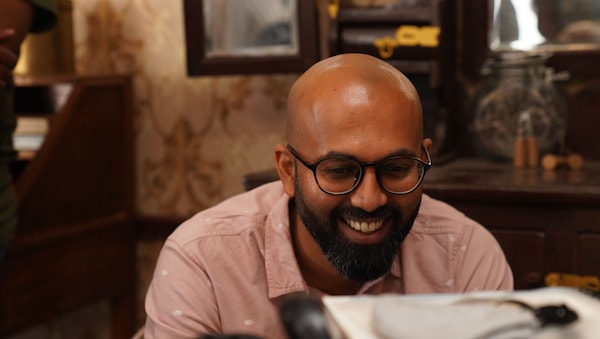
Santo Mohan Veeranki
Last Updated: 10.12 PM, Mar 17, 2022
The real-life story of first-time director Santo Mohan Veeranki, whose Stand Up Rahul hits theatres this week, is as good as a film script with several interesting twists and turns and an intriguing philosophical bent. No wonder, we aren't surprised when the filmmaker says that fictionalising many of his life experiences helped him shape up his feature film. From growing up in a lower-middle-class family in Pune to building a career as a design engineer in the UK and leaving a comfy life for a career in films impulsively, Santo's graph is full of enriching and equally wacky incidents.
All his years of mad passion, hard work and conviction are finally fructifying into something concrete with Stand Up Rahul, which stars Raj Tarun, Varsha Bollamma, Murli Sharma and Indraja. It's hard to believe that the filmmaker, who is effortless with his conversations today, was an introverted child once. When and where did the child transform into a responsible man, living life on his own terms? We find out, in an elaborate conversation with him for OTTplay.com
Growing up away from Telugu roots, believing in global identity
My father used to work in Tata Motors, Pune and lived in the outskirts of the city. People from different cultural backgrounds - Maharashtrians, Malayalis, Tamilians, Marvadas - were part of the community. I grew up more so as an outsider and it helped me think beyond my cultural roots, Telugu identity. My viewpoint became global very early in my life. I was always thinking beyond language or geographical boundaries.
I was a naughty child initially but somehow became introverted with time. I was shy, never really participated in any school events on the lines of drama et al, though I was inclined to sports - cricket, basketball. I grew up in a poor family, toys weren't even part of my childhood and we barely visited cinema halls. I made up for that with the sports activities in school. Growing up, money was scarce and on several occasions, I had to fight for what I wanted, even a toy. Gradually, I wanted to own what I do and not ask anyone for it.
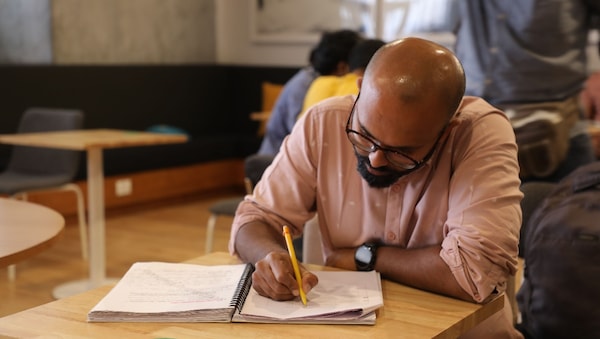
Engineering days, the bold declaration and the transformative experience
Even if people call me hardworking today, it's because of my humble beginnings back home. I saw education as a tool to raise my standards of living. One of my major learnings was during my engineering days when my parents took a loan from our neighbours to pay the fees. Just when one expected my engineering study to be a fairy tale, I had flunked in a couple of subjects and my parents, who worked hard to pay my fees, didn't even scold me for it.
I couldn't sleep the night I broke the news (about me flunking) to them, they were thoroughly disappointed. The sleepless night changed a lot of things in me. There came a point where I had to take charge of my life and I didn't want it to be ordinary by any means. I made a declaration in front of my friends that I would top the college henceforth. The idea of bold declarations in my life came from there. Many wondered what was I even talking about!
The thing with declarations is that it helps your actions exceed your current capabilities. During this phase, I decided that I had to take up all decisions in my life with my gut feeling and stand by it, come what may. Since the first semester of the third year, I was the topper till the end of the course. The experience taught me the significance of application to make it big in life. One just needs to take up something with conviction and I truly believe they can accomplish their aims.
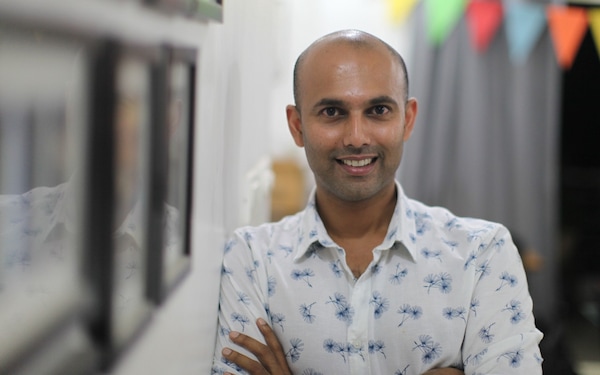
Moving to the UK and life as a design engineer
I got placed in Infosys initially and I was part of an aerospace wing that they had just started. Later, I got placed in Airbus and moved to the UK. Moving to the UK may have given cultural shocks to many but I realised I was better prepared to handle it. My childhood experiences came to use here, I was fine with being around people with multicultural backgrounds. I took to this experience like fish to water. I didn't socialise much though I enjoyed the place, the weather, the food.
Experiencing life in a country beyond India was exciting and films were my companion there. I wasn't quite familiar with cinema back then and watched films occasionally. The movie-watching hobby intensified in England and Bristol, where I stayed, had a good ambience for arthouse cinema to flourish. I developed a taste for cinema there and films became the focal point of my life. After my 9 to 5 job, I watched movies every day.
During the weekends, I had breakfast in the mornings, watched films all day using a monthly pass (literally abused that) and had my lunch, dinner in cinema halls. That was my life for almost four years. I preferred to watch films alone and was not big on socialising. I began to pick up nuances of filmmaking, Youtube videos helped me understand the medium from an academic perspective. I started writing stories, made short films soon.
The impulsive decision to return to India
The clear thought that I wanted to be a filmmaker dawned upon me very late in life. It was 29 when it was evident that films were no longer a hobby but a passion. If I was planning to relocate to India, it was with the idea to do something with films. It wasn't until 33 that I dared to take the plunge. There was a lot of conflict in my head between career and passion. I was leading an aspirational life in the UK given my lower-middle-class upbringing - owning an Audi, earning big, a good job, travelling regularly, this was huge for someone who didn't even own a toy car.
When I was in Machu Picchu in the middle of a trip, I got a call from my mentor, filmmaker Satish Kasetty (the director of Terror) that a film that I had co-written for got funded and the shoot was to start soon. He had casually told me that it was time I did something to explore my passion for films and hung up, but his words stayed with me. It was September 6, 2013, I was close to completing 10 years in the UK and it hit me that I could end up being in the same job, within the safety net and nothing about my life would change even in the next decade.
I sat on a mountain near Machu Picchu, surrounded by nature, introspecting my decisions. Something about reading Gandhi's 'My Experiments with Truth' during the trip had a profound impact on me. The book transported me into a different zone and I typed in my resignation letter instinctively, flying immediately to Hyderabad, not knowing anyone in the city beyond Satish Kasetty. My family was based around Visakhapatnam and Krishna district and I ended up staying for around six months in his house.
Starting 'Tale Tellers Troupe'
Films were always a priority when I returned to India but I didn't want it to consume my life completely. My bigger goal in life is to experientially exist. I want to exist through various experiences, be it Vipassana, doing various courses; I even started a film club called 'Cinephiles'. I always had stage fright and looked for excuses to escape whenever I had to present something in my job too. It was holding me back in terms of many leadership opportunities.
I had many thoughts in my mind but never gathered the courage to share them. In that pursuit of overcoming stage fear, I dabbled in stand up comedy and became familiar with the fraternity. I took a lot of time to do stand up shows but when I did, they bombed big time and it was the toughest of mediums to confront my fears, like climbing Mt. Everest. This experience surprisingly didn't affect me much, in fact, I realised that my social anxiety had dipped after it.
I began doing many events at cultural venues and decided to start a storytelling group - Tale Tellers Troupe. I am proud of TTT and how a lot of people associated with it, went on to do a variety of things in life. We made an impact on around 1400 people who never took to the stage in their lives and gave them the confidence to open up. It was a small step towards change and I couldn't have been happier.
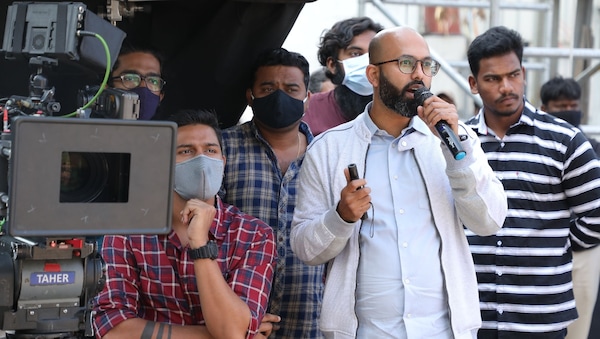
Collaborating with Anusha Rao and Prashant Yerramilli for his debut
I had written Stand Up Rahul for someone else and it was supposed to be directed by Satish Kasetty. Back in the UK, I was more into thrillers and because Satish was more into the rom-com space, I wrote this story. The story stayed with him for a few years when he was occupied with Terror (which was a crime thriller I also wrote for, I wasn't complaining). When I came back to India and we got talking, Satish realised that I put a lot of my life experiences into it and it would be better if I directed it.
Standup wasn't even part of the script then. The skeletal idea was in place - it was based on the fact that I could never take a stand for my family, passion and relationships. I was in a live-in relationship while writing the story and several life experiences found made it to the script. While redrafting the story, I wanted to fill it with as many real-life instances as possible. When the standup angle came into the story (which was literally about a guy who had to stand up for his decisions in life), things fell in place.
I had a very global outlook towards cinema initially and I wanted to give a local touch to the script by collaborating with Anusha and Prashant Yerramilli (only to realise that their approach was similar to mine). All of us had a great time brainstorming and nothing of this felt like work. We finetuned the screenplay, the narrative became more polished and the female protagonist, Shreya, now had a bigger say in the story. The film was initially about Rahul and the script evolved to a point where the story was driven by Shreya's character.
We brought a dialogue writer Kishore just before the lockdown. I chose someone who has never written dialogues for a film before. I wanted someone raw and fresh for the film and yet someone who had a good grip on the language. The screenplay was just getting better with every draft and conversation but it was the research for the stand-up portions that took a lot of our time.
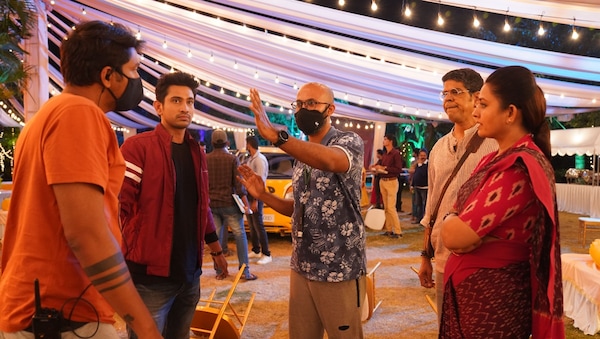
Technically equipping himself for a career in cinema, the leadership on sets
I believe my life has trained me enough to become a filmmaker and that's why I am a great believer in experiential learning. To give you a context, like the engineering days declaration about being a topper for the rest of the course, I wanted to venture into a zone in rom-coms that hasn't been explored before. The entire aerospace experience taught me that you can't build an aeroplane without drawing every element on paper. The reason why everyone involved with the film agreed to come on board with the very first narration was that I was thoroughly prepared for every meeting.
Beyond the bound script, I had a clear idea of the costumes that a character was going to wear at a particular time in the story, the location, the music, the background score and I used to play them in front of people too. I was coming from a professional experience (in the UK) where a complete structure was in place for everything. Even for TTT, a not-for-profit group, I had to inspire people to work for a cause. The learnings from these experiences made my job very easy as a filmmaker on sets.
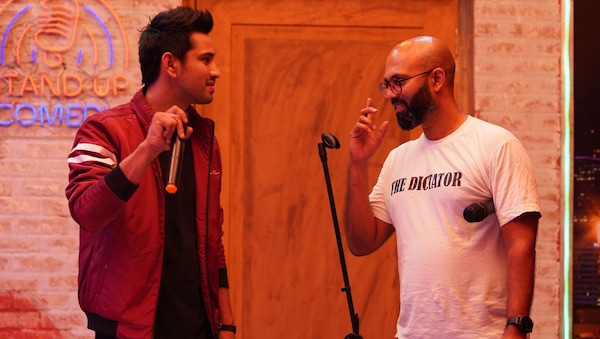
Bringing Raj Tarun on board, roping in a team against conventions
Though he wasn't my first preference for the role, something about him made me feel that he would get this part right. I didn't want to get carried away by the vibe though and made him audition for it; his performance convinced me that he was the right choice to play Rahul. My bigger goal in life is to do something that inspires people and convey my thought to a larger audience. If I take up an actor with an urban guy image, the film's reach would be limited to metros, where the awareness of standup as an art form is already there.
What if someone who has a strong fan base in tier-2, tier-3 cities came on board for the role? Raj Tarun's core fan base lies in the interiors of AP and Telangana and through him, I wanted to take the idea of standup to the kids there. Even if one kid is inspired to take this up as a career, my job is done. I knew that if I bring someone who was suited to play Stand Up Rahul, there wasn't much I would be contributing to the film as a director.
If I could convince audiences about Raj Tarun playing a standup comedian in my film and move them with the narrative, it would also be a perfect showcase of my mettle to the public. It's like me saying, 'Hey, there's a new filmmaker in town, you better take note of him.' It's the same reason I decided to rope in Sweekar Agasthi as a composer too, who was getting stereotyped in the small-town space. Melody was something I was very keen on; it was a common link to all albums of Sweekar's.
You'll be surprised to know how much I had to fight to rope in Varsha (Bollamma) as the female lead. This was much before Middle Class Melodies released and I had to fight tooth and nail to convince people that she was indeed the right choice for the role. Her casting may seem a safe choice today, but I knew what she could bring to a role like Shreya. The only character in the film that I wrote with an actor in mind was Vennela Kishore. You could say I was being a fanboy.
The core essence of Stand Up Rahul
More than being the coming-of-age tale about Rahul, the film is a commentary on the dysfunctionality that runs in most Indian families. Though the degree may vary, we often tend to brush it under the carpet. The film is about a child who grew up amidst a setup. The story doesn't push the blame on the parents and in fact, is about the guy's inability to stand tall at crucial moments in his life. It also deals with live-in relationships; I'm neither saying it's good or bad. All I am suggesting is that it's no different from marriage, except that there's an album and a mangalsutra.

 Premium
Premium